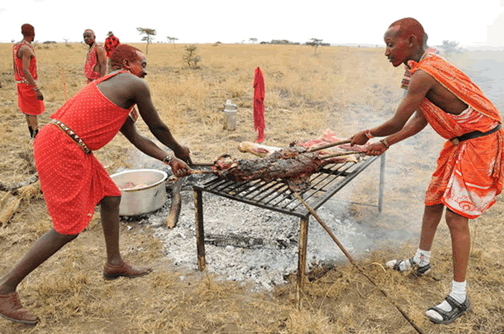 |
Mgeni njoo, mwenyeji apone. Let the guest come so that the host or hostess may benefit (get well). |
Swahili (Eastern and Central Africa) Proverb
Explanation:
Besides being a very popular Swahili proverb that is heard every day, this proverb is found in other African languages such as Haya (Tanzania) and Luyia (Kenya). The guest or visitor brings many blessings for the local people and home. Traditionally the proverb had different levels of meanings:
- The arrival of a guest meant a big meal of welcome, perhaps killing a chicken or a goat. All the local family members enjoyed the special meal with plenty of good food and drink. Everyone ate meat that they would not have on ordinary days. It was a special time of happiness for the children and a break from some of the ordinary family chores.
- The guest brought gifts for the host or hostess and the family members. Sometimes the guest brought meat or bananas as a symbol of building good relationships. If the visitor came with news of a death in his or her family this could also be considered a type of gift — the guest was offering himself or herself in real life.
- The guest brought new things (for example, medicine, seeds) that could help the life of the local residents. Sometimes the local people got well by using the new medicine. Thus the proverb had a literal meaning on one level.
- The guest brought news of relatives and friends living in other parts of the country. This is an important part of the African extended family network. The Nyamwezi Ethnic Group in the Tabora area of Tanzania emphasizes that a guest should be received well because the person may be bringing important and good news.
In the same vein John Mbiti comments: "Hospitality and tender care are shown to visitors, strangers and guests. In the eyes of African peoples "The visitor heals the sick" (African proverb). This means that when a visitor comes to someone’s home, family quarrels stop, the sick cheer up, peace is restored, and the home is restored to new strength. Visitors are, therefore, social healers — they are family doctors in a sense."
There are very interesting parallels to Jesus Christ in this Swahili proverb. One of the African names for Jesus Christ is "Our Guest." Through the incarnation Christ became the most important guest of all time. He loved humankind enough to join the human race. He was the guest of the shepherds in Bethlehem; the guest of Joseph and Mary in the manger; the guest of Zacchaeus the tax collector ("Hurry and come down; for I must stay at your house today" — Luke 19:5), the guest of all people everywhere.
There are also significant theological parallels with this African proverb:
- Jesus comes to people as guest in the Eucharist, the source and summit of the Christian life and the sign and sacrament of union with the risen Christ and with each other. "Those who eat my flesh and drink my blood abide in me, and I in them" (John 6:56). "We who are many are one body, for we all partake of the one bread" (1 Corinthians 10:17).
Other than his Eucharistic presence Jesus comes to people in three ways. In his first coming he was seen on earth dwelling among people. In his final coming he will be seen in glory and majesty. These are visible presences. The second or middle coming is invisible and hidden. Human beings discern Christ’s presence through faith. Jesus who himself comes to us here and now says: "Listen! I am standing at the door, knocking; if you hear my voice and open the door, I will come in to you and eat with you, and you with me" (Revelation 3:20). Jesus leaves human beings free. People have to open the door of their hearts and lives and let the Lord come in. - Jesus brought the best gift possible — reconciliation between human beings and God. "So if anyone is in Christ, there is a new creation: everything old has passed away; see, everything has become new!" (2 Corinthians 5:17). He brought peace and love between human beings themselves. His gift of salvation, redemption, and eternal life is the most precious gift of all time. "But to all who received him, who believed in his name, he gave power to become children of God" (John 1:12). This is a great challenge for peace and reconciliation in Africa where presently 17 countries are involved in civil wars and internal conflicts.
- Jesus is the savior who comes as the guest who heals. He is the healing guest. Through their relationship with Christ human beings get well. Christ is the "Great Healer." Through the sacraments, prayer, and scripture he heals people of all sicknesses — physical, psychological, and spiritual. This is holistic healing. This resonates deeply with African people.
Rev. Joseph G. Healey, M.M.
Dar Es Salaam, Tanzania
E Mail: JGHealey@aol.com
(For a further explanation see Chapter 4 called "A Guest is a Blessing" in Towards an African Narrative Theology)

